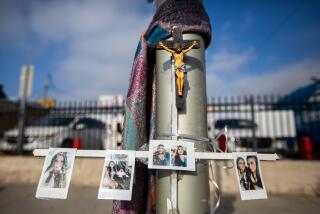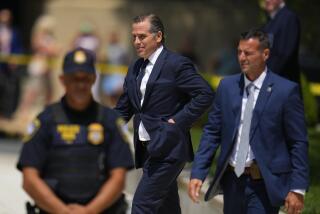FBI Sniper Is Charged in Ruby Ridge Killing
WASHINGTON — An Idaho county prosecutor Thursday charged FBI sniper Lon Horiuchi with involuntary manslaughter for killing the wife of anti-government activist Randy Weaver in a 1992 standoff at Ruby Ridge, Idaho.
A charge of first-degree murder was lodged against Weaver family friend Kevin Harris in the death of Deputy U.S. Marshal William Degan, who was killed as a team of marshals was checking out the remote Weaver cabin site in an attempt to apprehend Randy Weaver on federal gun charges.
The state charges, brought by Boundary County prosecutor Denise Woodbury, followed federal decisions last week not to prosecute Horiuchi on civil rights charges in the death of Vicki Weaver.
In 1993, a federal court acquitted Harris and Randy Weaver of murder, conspiracy and other charges related to Degan’s death, while convicting Weaver of firearms charges.
FBI Director Louis J. Freeh said he was “deeply disappointed” by the decision to file local charges against the 13-year FBI veteran. He noted that Horiuchi had been confronted with a split-second decision in firing the shot that killed Vicki Weaver, and said the Justice Department will continue to pay for Horiuchi’s legal defense.
Whatever the outcome of the criminal charges, they are certain to breathe new life into a controversy that has severely damaged the FBI’s reputation. The Ruby Ridge shootout, in which Weaver’s 14-year-old son, Samuel, also was killed, became a rallying symbol for large numbers of anti-government activists, including convicted Oklahoma City bomber Timothy J. McVeigh.
Horiuchi, in grand jury testimony and at the 1993 trial of Weaver and Harris, said he had been aiming for Harris--who was running for shelter in the cabin--but that, unknown to him, his shot struck Vicki Weaver, who was standing with a baby in her arms behind an open cabin door.
County prosecutor Woodbury said in a statement that Horiuchi was charged with killing Weaver by using a firearm “in a reckless, careless or negligent manner.” She said Horiuchi had fired “through the front door of the Weaver residence without first determining whether any person other than his intended target was behind the door.”
The U.S. Justice Department reiterated Thursday its conclusion of a week ago: that its two-year-long criminal investigation of the Ruby Ridge incident determined that willfulness on Horiuchi’s part in the killing of Vicki Weaver could not be established beyond a reasonable doubt. Willfulness is an element critical to proving a federal civil rights violation.
The Justice Department report also concluded that there was insufficient evidence to press criminal charges against Larry Potts, once the FBI’s No. 2 official, or his chief aide, Danny Coulson.
“There was also no evidence from which it could be concluded beyond a reasonable doubt that Horiuchi actually saw Vicki Weaver at the time he fired the shot that killed her,” the department said in summarizing its conclusion. The department noted Thursday that federal prosecutors and Idaho prosecutors enforce “different criminal laws, using different legal standards” in examining Horiuchi’s conduct.
“No federal crime covers the reckless, careless, or negligent use of a firearm,” the department said. “The federal investigation, which involved hundreds of interviews and hundreds of thousands of pages of documents, concluded that the available evidence did not support a federal criminal prosecution of Horiuchi.”
Horiuchi’s lawyer, Adam S. Hoffinger, said he was “profoundly distressed and troubled” by the decision to charge his client “after five years, particularly in the face of Mr. Horiuchi’s exoneration last week.”
The first-degree murder charge against Harris alleges that he killed Degan “willfully and with malice aforethought.” Woodbury said Degan was shot “after having been chased by Kevin Harris and Samuel Weaver for approximately 1,000 feet while in retreat, and was killed over 600 feet off the Weaver property.” Samuel Weaver was killed moments after Degan during a firefight with the marshals’ surveillance team.
Woodbury said the boy’s death “has been determined to be a justified homicide based on self-defense.” Earlier Senate and courtroom testimony showed that Samuel Weaver fired on the marshals’ team after his dog was shot.
In announcing the justified-homicide conclusion, Woodbury said an extensive search by personnel from the Boundary County Sheriff’s Department and the Idaho Criminal Investigation Bureau had recovered the round that killed the younger Weaver. FBI agents and other federal investigators had failed to find the bullet despite intensive searches.
Woodbury said Harris also was charged with aggravated assault on Arthur Roderick, another member of the marshals’ team.
Harris turned himself in Thursday afternoon at the Ferry County Courthouse in Republic, Wash., his hometown. A large crowd of supporters greeted him outside, carrying signs reading “Already Acquitted” and “Case Closed.”
Among the supporters were Harris and Weaver family members, including Weaver’s three daughters.
Harris made a brief court appearance in Ferry County and was expected to be brought to the Boundary County Jail, said Ann Thompson, a Boundary County spokeswoman.
Harris was “extremely dismayed by this, just as I have been, but he knows he’s not guilty of these charges,” said his attorney, David Nevin, at a Boise, Idaho, news conference.
“It’s perplexing to me,” Nevin said, that Horiuchi, “who sat up on the hill in a protected position, with a sniper rifle . . . and a 10-power scope and . . . admitted under oath he intended to kill, he shot to kill-- he’s charged with manslaughter,” Nevin said.
“And a kid who was walking down a forest road and got jumped by a bunch of people who looked like Black September terrorists, complete with camouflage masks . . . and who didn’t identify themselves . . . and who shot a little 14-year-old boy in the back as he was running away, he’s charged with first-degree murder,” the attorney said.
“That doesn’t seem right.”
The prosecutors had only until today to file the manslaughter charge against Horiuchi because the five-year statute of limitations would have run out. There is no statute of limitations on the murder charge, which carries the death penalty.
The state charges against Harris do not constitute double jeopardy, because the state and federal government are considered independent sovereigns for legal purposes, authorities said.
That is disputed by Harris’ attorney.
“It absolutely is a case of double jeopardy,” Nevin said. “When the United States government prosecutes a person for the same act, they can’t again be prosecuted in the courts of that state.”
As an example of how Ruby Ridge has become an important symbol for anti-government figures, McVeigh expressed his disgust over the federal role there and near Waco, Texas, the following year. In fact, he boasted to friends that he and others had written to Horiuchi warning him that “what goes around comes around.”
Times staff writer Richard A. Serrano contributed to this story.
More to Read
Sign up for Essential California
The most important California stories and recommendations in your inbox every morning.
You may occasionally receive promotional content from the Los Angeles Times.










